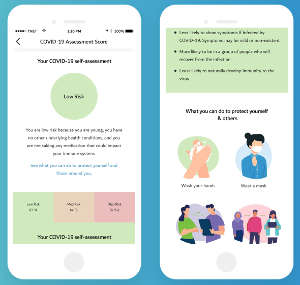Using AI to control energy for indoor agriculture
30 September 2024
Published online 12 June 2020
Arab entrepreneurs are tackling the pandemic head-on with artificial intelligence, telehealth, 3D-printed ventilator parts, and contact tracing apps.

Nabta Health
Enlarge image
Using a virtual personal assistant called Aya, the platform provides COVID-19 risk and symptom assessments for women in the Arab region. Nabta’s co-founder Saba Alzabin says her team recognized the particular vulnerability of people with underlying health conditions when the data started coming out from China.
“Using the app, women can ask Aya questions and also complete a COVID-19 assessment,” she explains. “Aya takes them through their risks, and they can be linked to relevant content. For example, they can ask ‘I have diabetes. What does that mean for COVID’?”
Nabta’s other co-founder, Sophie Smith, explains that they also aim to provide the service, through SMS interactions, to women who do not have smart phones.
Asked about privacy, Smith says, “We are HIPAA (the US Health Insurance Portability and Accountability Act) and GDPR-compliant (the EU’s General Data Protection Regulation). Data privacy is very important to us.”
Basheer Salaytah is one of many innovators worldwide who have embraced contact tracing technologies. Salaytah led the creation of Aman App, a mobile application that notifies users if they are in the vicinity of a diagnosed COVID-19 patient. The application was developed for Jordan's Ministry of Health by the COVID-19 Jotech Community, a group of tech-savvy volunteers.
“We prefer to call it an exposure-detecting app,” explains Salaytah. “All data will be stored on the user’s phone to ensure privacy. If a user is diagnosed with COVID-19, people who have recently been in contact with that case will be notified through the app, which then advises them to isolate and call the ministry’s COVID-19 hotline,” he says. At least 225,000 Android users have already downloaded the app. The iOS version is currently waiting for approval from Apple.
The use of contact tracing apps has been met with some resistance worldwide.
“No automated contact tracing app can guarantee privacy,” says Adam Schwartz, senior staff attorney at US-based Electronic Frontier Foundation. “By definition, it is an electronic tool that gathers, stores, and at least sometimes shares personal information.”
However, Schwartz says that decentralized proximity apps are “far better” than centralized ones.
Hala Madanat, director and distinguished professor at the School of Public Health at San Diego State University, believes contact tracing has limited value without human contact tracers. She explains that most apps are unable to detect whether individuals have been within two metres of each other or for how long. “You can’t ask people to quarantine if you don’t know if they were really exposed,” she says. Many apps also run on Bluetooth, quickly draining the battery, which means many people will not comply. Human contact tracing, however, allows follow-up and connecting people to the resources they need.
Meanwhile, Eon Dental, in Jordan, which produces 3D prints of dental braces, is now collaborating with Jordan’s Royal Scientific Society to produce spare parts for ventilators. Immensa, a UAE-based start-up that focuses primarily on the oil and gas industry, says it is printing thousands of face shields daily, exporting them to Europe, the US, and to the rest of the Middle East.
In Amman, Jordan, Altibbi is an end-to-end digital health platform that provides telehealth services and consultations in addition to medical information in Arabic. Altibbi launched a dedicated COVID-19 hotline in collaboration with Jordan’s Ministry of Health. Dialling 111 connects callers to certified doctors who can provide medical assessments without putting themselves or others at risk. Altibbi’s founder, Jalil Labadi, says the government asked them to help launch a hotline that can reduce traffic to public healthcare services.
“We launched it in less than five hours and we had 70 doctors to pick up the calls. The initial estimate from the government was that we would receive 500 calls per day. Within a week we were getting 15,000 consultations every day, so we had to recruit more doctors and upgrade our technical infrastructure. The waiting time has never exceeded one hour, even at peak time.”
Altibbi has also rolled out a video consultation feature using their cloud-based clinic software to more than 5,000 doctors in Jordan and Egypt.
doi:10.1038/nmiddleeast.2020.62
Stay connected: